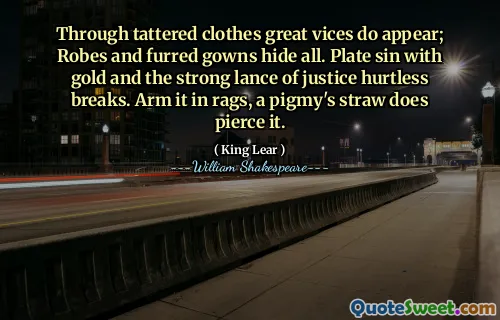A knave; a rascal; an eater of broken meats; abase, proud, shallow, beggarly, three-suited,hundred-pound, filthy, worsted-stocking knave; alily-livered, action-taking knave, a whoreson,glass-gazing, super-serviceable finical rogue;one-trunk-inheriting slave; one that wouldst be abawd, in way of good service, and art nothing butthe composition of a knave, beggar, coward, pandar,and the son and heir of a mongrel bitch: one whom Iwill beat into clamorous whining, if thou deniestthe least syllable of thy addition.
The quote from King Lear portrays a character filled with disdain, describing an individual in harsh and vivid terms. It lists numerous insults, painting the subject as a despicable knave, characterized by dishonesty, cowardice, and a lack of integrity. The language emphasizes the speaker's contempt, using a rich variety of negative descriptors to convey deep animosity. This character is not only seen as a coward but also as someone who would betray their own obligation under the guise of service.
This extensive accusation reflects the issues of loyalty and betrayal central to the play. By referring to the subject as "a whoreson" and other degrading terms, the speaker reveals their strong feelings of betrayal and disappointment. The quote captures the essence of the conflict within King Lear, highlighting the fragile nature of human relationships and the consequences of moral decay among characters. The vivid imagery and emotional intensity underscore the dramatic tension that runs throughout the narrative.
